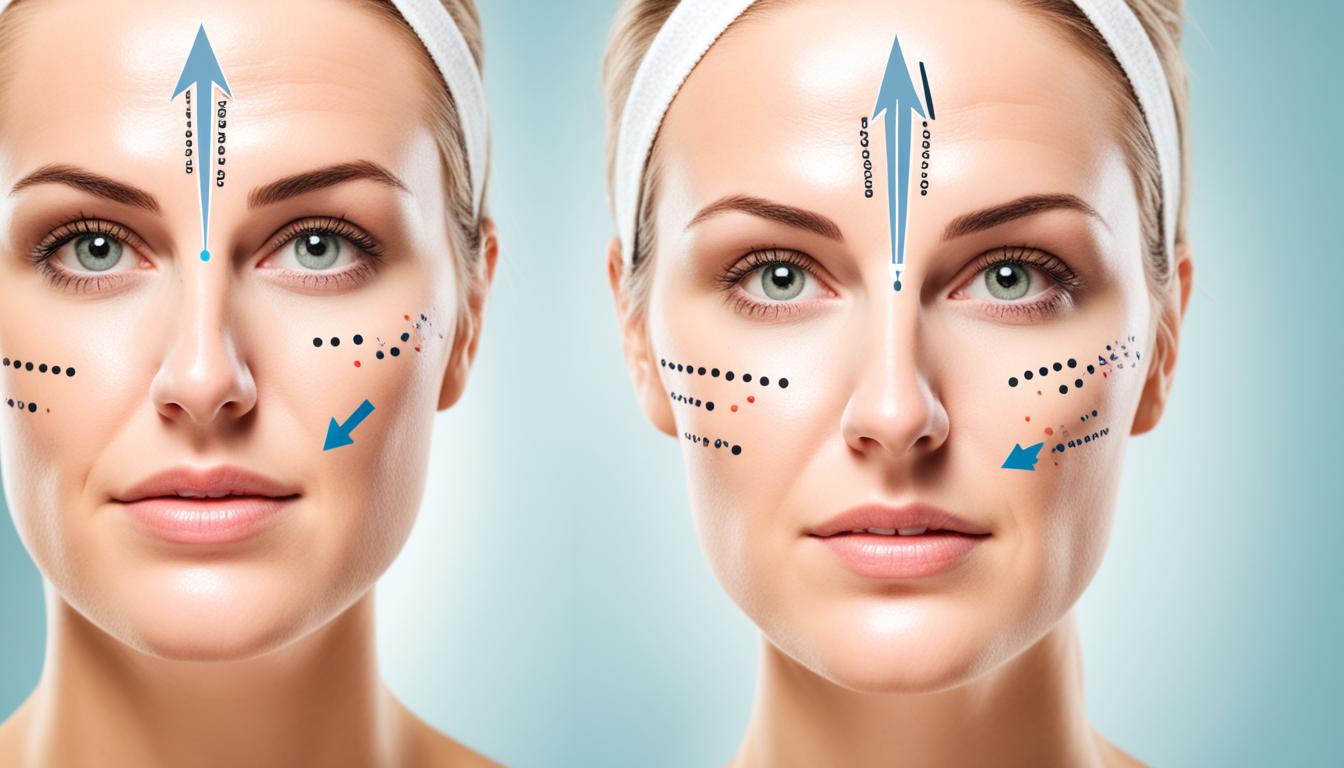If you’ve suddenly developed cystic acne, you may be wondering what could be causing this frustrating and painful skin condition. Cystic acne can appear out of nowhere, even if you’ve never experienced it before. It’s important to understand the possible causes and triggers to effectively manage and treat this condition.
Why Am I Getting Cystic Acne All of a Sudden?
Causes and Triggers of Cystic Acne
Cystic acne, characterized by large, painful, and inflamed pimples beneath the skin’s surface, can be caused by various factors. One common cause is hormonal changes, which play a significant role in the development of this severe form of acne. Hormonal fluctuations that occur during certain life stages, such as menstruation, menopause, and pregnancy, can trigger sudden acne flare-ups.
Additionally, conditions like polycystic ovarian syndrome (PCOS) can lead to hormonal imbalances that contribute to the development of cystic acne. These hormonal changes can result in an increase in sebum production, clogging the hair follicles and leading to the formation of painful cysts.
Stress is another factor that can exacerbate cystic acne. When you are under stress, your body releases cortisol, a stress hormone, which can stimulate the skin’s oil glands and lead to the production of excess sebum. This excess oil, combined with dead skin cells and bacteria, can become trapped in the hair follicles, causing inflammation and the formation of cystic acne.
In addition to hormonal changes and stress, dietary factors can also contribute to sudden acne flare-ups. Consuming a diet high in refined sugars, unhealthy fats, and processed foods may increase the risk of developing cystic acne. These foods can trigger inflammation in the body and disrupt hormonal balance, leading to the development of acne.
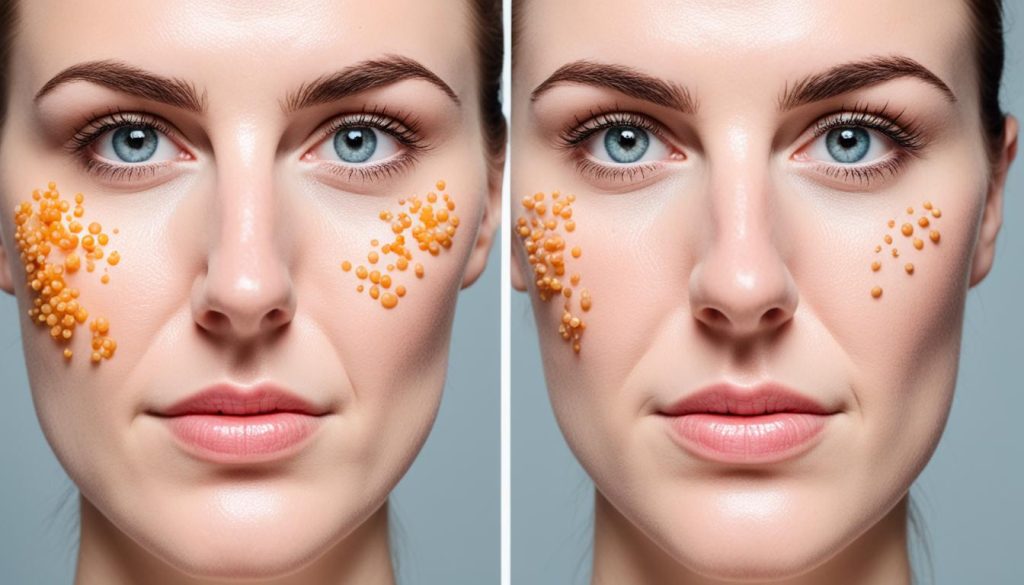
Treatment Options for Cystic Acne
When it comes to treating sudden cystic breakouts, there are various options available to help manage this challenging condition. It is important to consult a doctor to determine the most appropriate treatment for your specific condition.
One common treatment option for cystic acne is the use of stronger medications such as prescription lotions or creams. These topical treatments often contain ingredients like benzoyl peroxide, salicylic acid, or retinoids, which can help reduce inflammation and unclog pores.
In some cases, oral antibiotics may be prescribed to help control the bacteria that contribute to cystic acne. These antibiotics work by reducing inflammation and preventing further infection.
For severe cases of cystic acne, steroid injections may be utilized. These injections help reduce inflammation rapidly and can provide relief from pain and swelling.
In certain situations, prescription capsules or hormonal therapies may be recommended. These treatments target the hormonal imbalances that can contribute to cystic acne, especially in cases where hormonal changes are the underlying cause.
Remember, every individual’s situation is unique, and what works for one person may not work for another. Consulting a dermatologist is essential to determine the most effective treatment plan and to ensure optimal results.
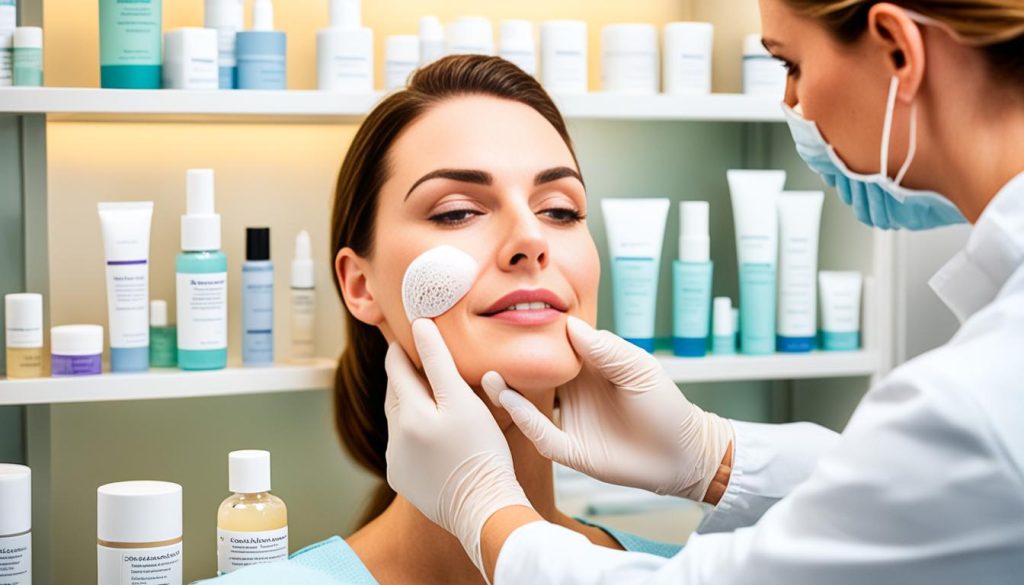
How to Manage Cystic Acne?
Cystic acne can be a challenging and persistent skin condition. If you’re wondering how to stop cystic acne from forming or prevent sudden cystic acne breakouts, here are some tips to help manage your condition:
1. Avoid Touching or Picking at the Pimples
It can be tempting to pop or pick at cystic acne, but this can actually worsen the condition. Picking at the pimples can lead to inflammation, infection, and scarring. To prevent further damage, it’s best to avoid touching or picking at the affected areas.
2. Follow Your Doctor’s Treatment Plan
If you have cystic acne, it’s important to consult a dermatologist who can recommend the most suitable treatment plan for your specific condition. This may involve prescription medications such as topical creams or gels, oral medications like antibiotics, or in severe cases, isotretinoin. It’s essential to follow your doctor’s instructions and take the prescribed medications as directed.
3. Maintain Good Skincare Practices
In addition to medical treatment, maintaining good skincare practices is crucial for managing cystic acne. Here are some tips:
- Cleanse your face twice a day with a gentle cleanser to remove excess oil, dirt, and bacteria.
- Avoid using harsh or abrasive products that can irritate the skin.
- Use oil-free, non-comedogenic moisturizers to keep your skin hydrated without clogging pores.
- Protect your skin from the sun by using a broad-spectrum sunscreen with an SPF of 30 or higher.
Consistency is key when it comes to skincare. Stick to your routine and be patient as it may take time for improvements to show.
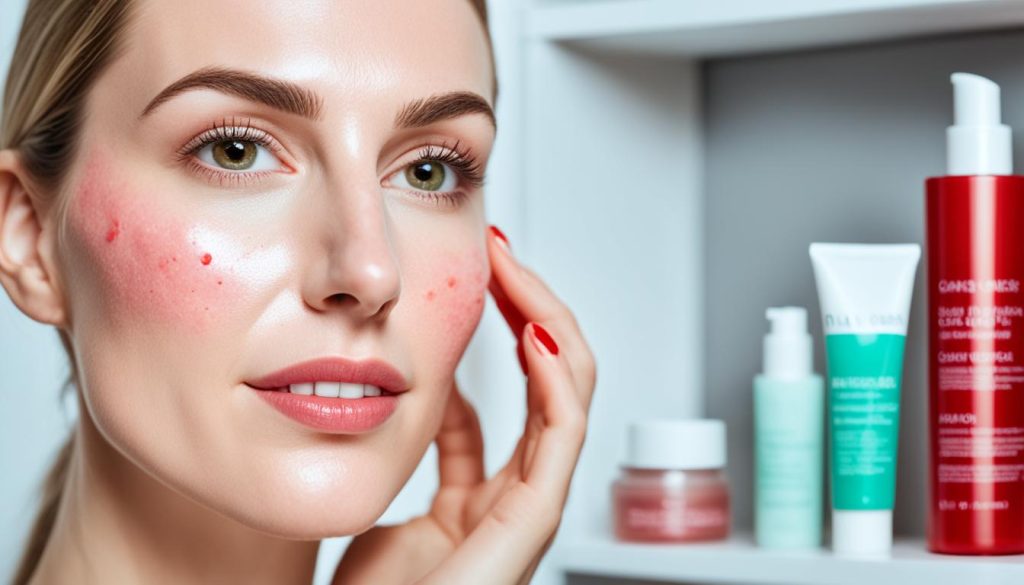
Myths and Facts About Cystic Acne
When it comes to cystic acne, there are many myths and misconceptions. Let’s separate fact from fiction:
Myth: Cystic acne will go away without popping
It is commonly believed that cystic acne will disappear on its own if you leave it untouched. However, this is not true. Cystic acne is a severe form of acne that requires proper treatment. Without intervention, it can persist for long periods, causing discomfort and potential scarring.
Fact: Popping cystic acne can lead to further infection or scarring
While it may be tempting to squeeze or pop cystic acne, this can actually make the situation worse. Popping or squeezing the pimples can push the infection deeper into the skin, leading to increased inflammation and potentially causing permanent scarring. It’s best to avoid touching or manipulating cystic acne lesions and seek professional treatment instead.
Myth: Ice helps treat cystic acne
Some people believe that applying ice to cystic acne can help reduce inflammation and improve the condition. While ice may provide temporary relief by numbing the area and temporarily shrinking blood vessels, it is not a long-term solution for treating cystic acne. Ice alone cannot eliminate the underlying causes and should not be relied upon as a standalone treatment.
Myths vs. Facts
| Myth | Fact |
|---|---|
| Cystic acne will go away without popping | Cystic acne requires proper treatment and will not disappear on its own |
| Popping cystic acne is beneficial | Popping or squeez ing cystic acne can lead to infection and scarring |
| Ice helps treat cystic acne | Ice provides temporary relief but is not a long-term solution for treating cystic acne |
It’s essential to separate fact from fiction when it comes to cystic acne to ensure you’re taking the most effective steps towards managing and treating this condition.
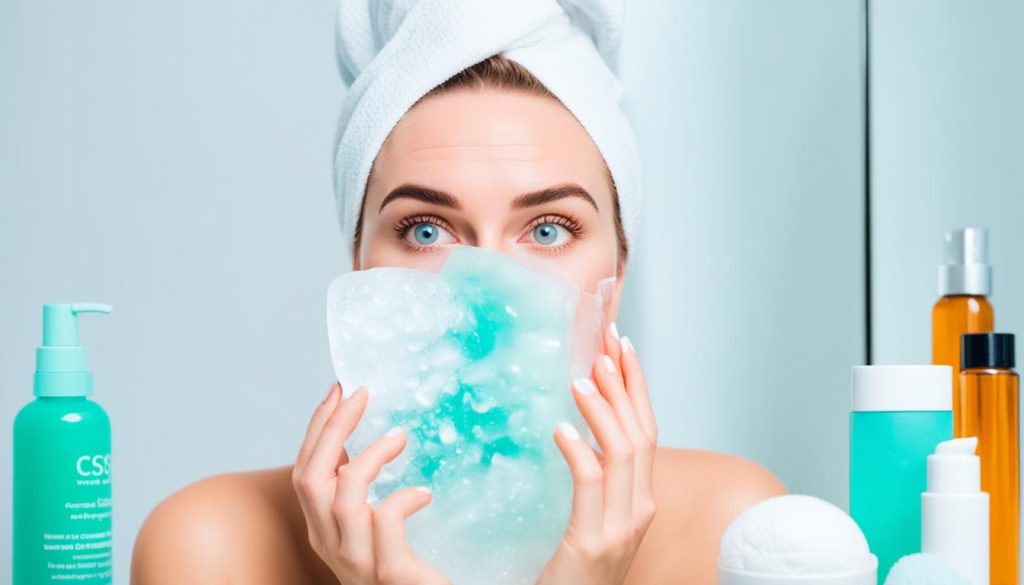
The Role of Diet in Cystic Acne
When it comes to cystic acne, the role of diet is often a subject of discussion. While certain foods have been associated with a higher risk of acne outbreaks, the impact of diet on cystic acne can vary from person to person.
Refined grains and sugars, as well as chocolate and dairy products, are often cited as potential triggers for cystic acne. These foods are thought to increase inflammation and insulin levels in the body, which can contribute to the development of acne.
However, it’s important to note that the relationship between diet and cystic acne is not yet fully understood. Some individuals may find that eliminating certain foods from their diet helps improve their acne, while others may not see any noticeable changes.
It’s also worth noting that diet is just one piece of the puzzle when it comes to managing cystic acne. Factors such as hormones, stress, and skincare routine also play a significant role in the development and severity of acne.
Can Hot Water Remove Pimples?
Hot water alone is not an effective treatment for cystic acne. While it may provide temporary relief by opening up pores and reducing inflammation, it does not address the underlying causes of acne.
To effectively treat and manage cystic acne, it’s important to follow a comprehensive approach that includes proper skincare, a healthy diet, stress management, and, if necessary, medical treatment. Consulting with a dermatologist can help determine the best course of action for your specific situation.
Remember, everyone’s skin is unique, and what works for one person may not work for another. Finding the right combination of treatments and lifestyle changes may require some trial and error, but with patience and persistence, it is possible to achieve clearer, healthier skin.
Diet Tips to Help Manage Cystic Acne
- Limit or avoid foods known to trigger acne outbreaks, such as refined grains, sugar, chocolate, and dairy products.
- Incorporate more fruits, vegetables, and whole grains into your diet, as they are rich in antioxidants and fiber, which can support overall skin health.
- Stay hydrated by drinking plenty of water throughout the day. Proper hydration can help keep the skin moisturized and may aid in maintaining a healthy complexion.
- Avoid excessive consumption of oily and greasy foods, as they can contribute to clogged pores and acne breakouts.
- Maintain a balanced diet and aim for variety in your meals to ensure you are getting a wide range of nutrients that support skin health.
Foods to Limit or Avoid for Cystic Acne
| Food Category | Examples |
|---|---|
| Refined Grains | White bread, pasta, rice |
| Sugary Foods and Beverages | Soda, candy, pastries |
| Highly Processed Snacks | Chips, crackers, packaged cookies |
| Chocolate | Milk chocolate, dark chocolate |
| Dairy Products | Milk, cheese, yogurt |
Home Remedies and Self-Care for Cystic Acne
If you’re dealing with cystic acne, it’s important to seek proper treatment from a healthcare professional rather than attempting to draw out the cyst on your own. However, there are some home remedies and self-care practices that can help manage symptoms and prevent further irritation.
1. Warm Compresses
Applying warm compresses to the affected area can help reduce inflammation and promote healing. Soak a clean cloth in warm water, wring out the excess moisture, and gently press it against the cystic acne for 10-15 minutes. Repeat this several times a day to soothe the skin and alleviate discomfort.
2. Gentle Facial Cleansers
Using a mild and non-abrasive facial cleanser is essential for effectively managing cystic acne. Look for products that are specifically formulated for acne-prone skin and contain ingredients like salicylic acid or benzoyl peroxide. Avoid harsh scrubbing or excessive washing, as this can aggravate the skin and worsen the condition.
3. Avoid Picking at the Skin
Resist the temptation to pick or squeeze cystic acne, as this can lead to further infection, scarring, and delayed healing. Picking at the skin can also introduce bacteria and irritate the already inflamed area. Keep your hands away from your face and maintain good hygiene practices to prevent the spread of bacteria.
Remember that while these home remedies and self-care practices can provide temporary relief and support the healing process, they are not a substitute for professional medical advice and treatment. To effectively manage cystic acne and minimize its impact on your skin, consult with a dermatologist who can recommend the most appropriate treatment plan for your specific situation.
| Treatment Option | Description |
|---|---|
| Prescription lotions or creams | Topical medications that contain ingredients like retinoids or antibiotics to reduce inflammation and kill bacteria. |
| Oral antibiotics | Antibiotics taken orally to target bacteria and reduce inflammation. |
| Steroid injections | Injecting corticosteroids directly into the cyst to reduce inflammation and speed up the healing process. |
| Prescription capsules | Oral medications like isotretinoin (Accutane) that are prescribed for severe cystic acne. |
Conclusion
Cystic acne can be a challenging and painful condition, but with the right cystic acne treatment and self-care practices, it can be managed effectively. If you are experiencing sudden acne outbreaks and suspect it may be cystic acne, it is important to consult with a dermatologist to determine the best course of action for your specific situation.
A dermatologist will be able to diagnose your condition and recommend appropriate treatment options for cystic acne. This may include prescription lotions or creams, oral antibiotics, steroid injections, or prescription capsules. They can also guide you on how to manage cystic acne and prevent future breakouts.
In addition to medical intervention, following a consistent skincare routine and avoiding triggers such as touching or picking at the pimples can help manage the condition. Remember, seeking professional guidance and maintaining good self-care practices are crucial in finding relief from cystic acne.

